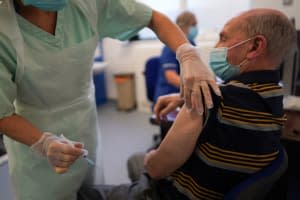Most people won't need a COVID-19 vaccine booster shot for years, vaccination experts predict

The U.S. Centers for Disease Control and Prevention's Advisory Committee on Immunization Practices is meeting next week to discuss whether immunocompromised Americans should be authorized to receive a third dose of COVID-19 vaccine, and Pfizer said last week it will seek regulatory approval for an eventual third booster shot of its vaccine amid the rapidly spreading Delta variant. Israel said this week it will begin administering a third Pfizer dose to severely immunocompromised adults, and Britain has announced a plan to administer booster shots beginning in September.
The rapid spread of the Delta mutation among unvaccinated pockets of the U.S. combined with Pfizer's announcement "has unleashed third-dose panic among the vaccinated," Politico reports. But global public health officials are outraged that vaccine-rich countries would consider third shots before health care workers in many countries have gotten their first dose of a COVID-19 vaccine. And most U.S. public health and government officials say people won't need a booster shot now or anytime soon.
"There's no evidence right now that the general population needs a booster dose because we're not seeing evidence of waning immunity or substantially reduced effectiveness against the Delta variant," William Moss, executive director of the International Vaccine Access Center at the Johns Hopkins Bloomberg School of Public Health, tells Politico. "I think for most people, outside those special populations, the immunocompromised and maybe the elderly — I think most people's immunity is going to last years, to be honest." He said if a variant manages to evade the vaccines, a booster shot may be needed, but he guessed it will be three or four years, or longer, before most people need an extra dose.
"I haven't seen evidence that a booster would be indicated for anybody, including the immunocompromised," Helen Boucher, an infectious-disease doctor at Tufts Medical Center in Boston, tells The Washington Post. She said the best way to protect immunocompromised people is to make sure everyone around them is vaccinated.
You may also like
Melania Trump reportedly tried 4 times to block an election night party at the White House
